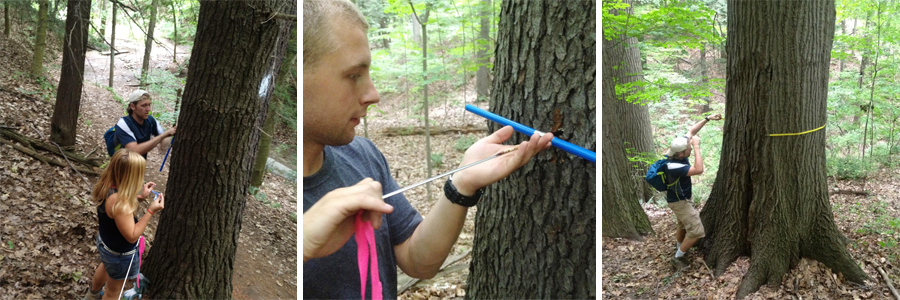Teaching
College of Idaho
Bio 345 Ecology WITH LAB
Ecology is the study of relationships among organisms, and between organisms and the environment. This study of the interrelationships between plants, animals, microorganisms and their environments will include discussion of population interactions and community organization, climate change, evolution and adaptation, biogeography, and models of population change, as well as applications of ecological concepts to real-world problems. The history of ecological ideas will also be discussed. Laboratories will involve original research design, ecosystem sampling and data analysis, discussion of many types of literature and presentation of ideas in a variety of formats.
Bio 350 Plant Ecology, Evolution, and Diversity WITH LAB
Plants have evolved a stunning diversity of forms and reproductive strategies, occupy some incredibly challenging ecological niches, and form the basis of food chains and human economic systems. This course surveys plant types emphasizing morphology, reproduction, ecology, geography, and the evolution of major groups. This includes examining water relations, photosynthesis, respiration, and plant-soil and plant-animal interactions that determine the relationships between plants and their physical and biological environments. This course will also explore the history of plant use in society, including the evolving relationships between humans and plants as food, medicine, fuel, fibers, and dyes. Laboratories will involve original research design, data analysis, discussion of literature, presentation of ideas in a variety of formats, and field-oriented components stressing plant identification, ecology, and systematics.
Bio 202 Organismal Biology WITH LAB
The second course in a three semester sequence for Biology majors. Examines reproduction, development, anatomy, and physiology of higher animals and plants, including trends in the evolution of plants.
Bio 203 Ecology, Evolution, and Diversity WITH LAB
The third course in a three-semester sequence for Biology majors. Examines the ecology, evolution, and diversity of life. Topics to be covered include population ecology, population genetics, evolution, phylogeny and classification, and a survey of the animal kingdom, including trends in animal evolution.
Bio 140 Idaho Natural History WITH LAB
Natural history is a field of (mostly) observational science focused on organisms in their natural environments. This course will provide a basic introduction to how landscapes and ecosystems of Idaho, but more generally, the Intermountain West, evolved from earliest geological time until European settlement, how they function, and how they have been modified as a result of human activities. In order to better understand this story, many principles of geology, climate, soils, ecology, biology, and evolution will be introduced.
RHODES COLLEGE
BioL 200 EVOLUTION WITH LAB
Evolution is the grand unifying idea of biology. This study of the evolutionary process covers genetic mechanisms of variation, natural selection change in populations, speciation, coevolution, and biogeography, as well as applications of evolutionary biology to real-world problems. The lab includes hands-on explorations of co-speciation, experimental evolution, phylogenetics, macroevolution modeling, and niche evolution.
BioL 322 Plant Diversity & Evolution WITH LAB
Plants have evolved a stunning diversity of forms and reproductive strategies, occupy some incredibly challenging ecological niches, and form the basis of food webs and human economic systems. This course explores plant morphology and physiological processes, reproductive strategies, the evolution of major lineages, ecology interactions, and relations to human populations as food, medicine, fuel, fibers, and dyes. The lab includes hands-on explorations of plant morphology, growth, and physiology, evolution and phylogenetics, niche evolution, community ecology, and field sampling techniques.
BioL 140 introduction to biology ii
An introduction to the fundamental components of organismal biology. This course explores topics in evolution and the diversity of life, plant and animal biology, animal behavior, and ecology.
BioL 141 BIOLOGY II LAB
This course introduces investigative techniques in biology and promotes the development of skills required for the analysis and presentation of scientific findings. This course aims to increase understanding of organismal biology by emphasizing topics at the level of organisms and above.
UNIVERSITY of colorado denver
Biol 3445 INTRODUCTION TO EVOLUTION
An introduction to the processes and patterns of evolution. Topics covered include: history of evolutionary thought, origin of life, evidence for evolution, phylogenetics, evolutionary genetics, natural selection and other evolutionary forces, and speciation and biodiversity.
university of nebraska-lincoln
Bios 998 GRADUATE SEMINAR IN SPECIES CONCEPTS AND SPECIATION
The study of biodiversity is a central focus of many biologists. This seminar course explores the history and theory relevant to species concepts and their differential application across the kingdoms of life.
Bios 998 GRADUATE SEMINAR IN PHYLOGEOGRAPHY
AND SPECIES DISTRIBUTION MODELING
Basic concepts and theory relevant to the application of phylogeographic methods, including rates of mtDNA and cpDNA evolution and their utility for genealogy reconstruction, gene trees vs. species trees, coalescent concepts and historical demography, molecular clock calibration, and the influence of life history and biogeography on patterns of relatedness.
rochester institute of technology
Bio 341 GENERAL ECOLOGY LAB
Emphasizes the development of testable hypotheses and implementation of appropriate observations and experiments on a series of topics relevant to field ecology in western New York.
university of rochester
Bio 225 LABORATORY IN ECOLOGY AND EVOLUTIONARY BIOLOGY
Emphasizes the development of testable hypotheses and implementation of appropriate observations and experiments on a series of topics relevant to ecological and evolutionary studies in western New York.
photos by R. Laport, J. Ramsey, & T. Ramsey.
Contact
ROBERT G. LAPORT
The College of Idaho
Department of Biology
2112 Cleveland Blvd.
Caldwell, ID 83605



